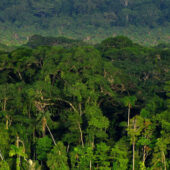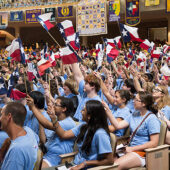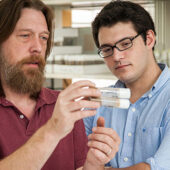Conservation liberal-arts style
 Forty years from now, the world's rainforests may be gone and with them our chance for a stable environment. Wake Forest's JAMAZON celebrates that creative minds from biology to music to history to English can join together to find the answers.
Forty years from now, the world's rainforests may be gone and with them our chance for a stable environment. Wake Forest's JAMAZON celebrates that creative minds from biology to music to history to English can join together to find the answers. Categories: Arts & Culture, Environment & Sustainability, Global Wake Forest, Happening at Wake, Research & Discovery

 Senior Peter Chawaga will never forget certain things about his first football game as a Demon Deacon. The enthusiasm surrounding games prompted his nostalgia for University traditions, but the home opener against Liberty was really just a backdrop for the pride that wells up inside all Wake Foresters collectively.
Senior Peter Chawaga will never forget certain things about his first football game as a Demon Deacon. The enthusiasm surrounding games prompted his nostalgia for University traditions, but the home opener against Liberty was really just a backdrop for the pride that wells up inside all Wake Foresters collectively. Maya Angelou, the Reynolds Professor of American Studies, will be inducted into the North Carolina Literary Hall of Fame this October. The Old Gold & Black spoke with Angelou about her inspirations, the state of race relations in America and her lesser-known time as a calypso singer.
Maya Angelou, the Reynolds Professor of American Studies, will be inducted into the North Carolina Literary Hall of Fame this October. The Old Gold & Black spoke with Angelou about her inspirations, the state of race relations in America and her lesser-known time as a calypso singer. When Wake Forest computer science professors and students introduce new ways to teach computer science to middle school students, the teachers at Hanes Magnet School can't wait to experiment with technology.
When Wake Forest computer science professors and students introduce new ways to teach computer science to middle school students, the teachers at Hanes Magnet School can't wait to experiment with technology. On August 30, more than 40 faculty members representing 13 academic disciplines visited first-year students in their residence halls. Each faculty pair, along with a residence life and housing staffer, welcomed an average of 60 students in the Class of 2016 through a program called Faculty House Calls.
On August 30, more than 40 faculty members representing 13 academic disciplines visited first-year students in their residence halls. Each faculty pair, along with a residence life and housing staffer, welcomed an average of 60 students in the Class of 2016 through a program called Faculty House Calls.
 For 10 years, Wake Forest and Reynolda House Museum of American Art have worked together to form academic connections – a relationship that showcases how a liberal-arts education mindset joins knowledge and resources in surprising ways.
For 10 years, Wake Forest and Reynolda House Museum of American Art have worked together to form academic connections – a relationship that showcases how a liberal-arts education mindset joins knowledge and resources in surprising ways. In July, Wake Forest was proud to host the 59th annual National Junior Classical League convention, helping to plan the event and providing faculty presentations, as well as giving the students a taste of the Demon Deacon lifestyle.
In July, Wake Forest was proud to host the 59th annual National Junior Classical League convention, helping to plan the event and providing faculty presentations, as well as giving the students a taste of the Demon Deacon lifestyle. Erik Johnson’s latest study, which appears in the current issue of the Genetics, uses the fruit fly to look at enzyme signaling as a key to developing new treatments for diabetes and as an aid in all sorts of metabolic research, including weight-loss drugs.
Erik Johnson’s latest study, which appears in the current issue of the Genetics, uses the fruit fly to look at enzyme signaling as a key to developing new treatments for diabetes and as an aid in all sorts of metabolic research, including weight-loss drugs. This summer, Wake Forest is home to 12 scholars from Spelman College, America's oldest historically black college for women. The scholars have teamed up with faculty in chemistry, communication, English, psychiatry and psychology to conduct research throughout the university.
This summer, Wake Forest is home to 12 scholars from Spelman College, America's oldest historically black college for women. The scholars have teamed up with faculty in chemistry, communication, English, psychiatry and psychology to conduct research throughout the university.
 “We wanted to introduce Wake Forest to China as we look for opportunities to create educational programs in the future,” said Linda McKinnish Bridges, associate dean of admissions. “Not only opportunities for students from China to learn about Wake Forest, but opportunities for Wake Forest students to study abroad or find careers in China.”
“We wanted to introduce Wake Forest to China as we look for opportunities to create educational programs in the future,” said Linda McKinnish Bridges, associate dean of admissions. “Not only opportunities for students from China to learn about Wake Forest, but opportunities for Wake Forest students to study abroad or find careers in China.”